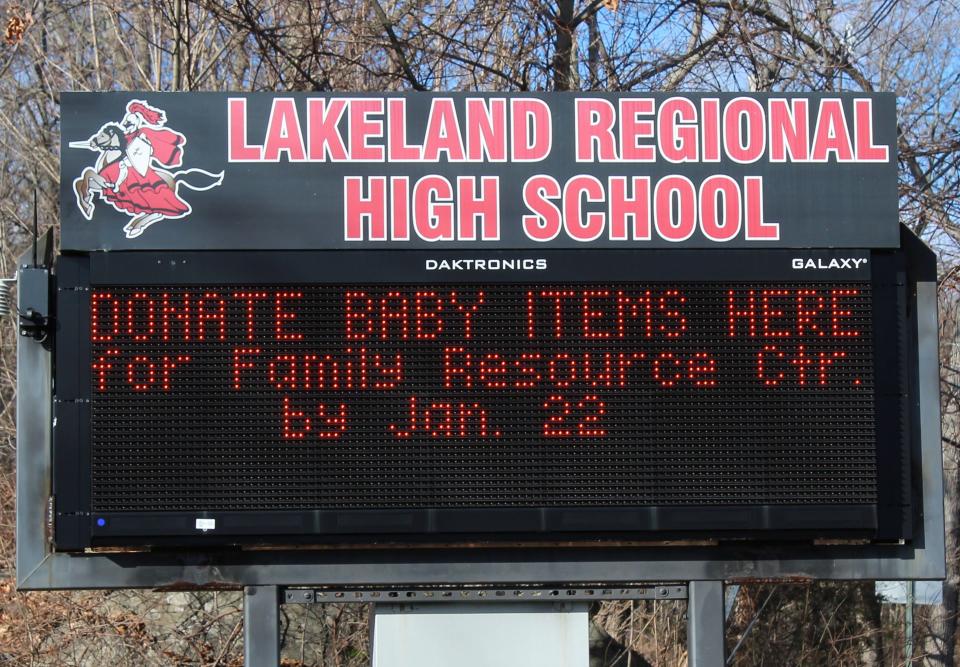NJ has tough gun laws, but local spending to boost school security has surged
Even though New Jersey has some of the strictest gun laws in the nation, the frequency of violence and shootings in K-12 schools nationally has made student safety in school buildings the “most pressing priority” for New Jersey’s school superintendents.
And, with another school year upon us, districts have responded, installing surveillance devices, panic alarms, shatter-proof windows and metal detectors, while hiring more school guards.
Searching for ways to pay for their security needs, they have also used referenda to raise funds and ballot questions to gauge voter interest.
But the state needs to bridge wide disparities that still exist between districts’ ability to pay for security measures, the New Jersey Association of School Administrators, which represents public school superintendents, said in its “School Security and Safety” report released in May.
Lawmakers rushed to approve new school security measures after the horrific massacre of 19 schoolchildren in Uvalde, Texas in May 2022, but the report, compiled a year later, says stark differences exist between schools’ security preparedness in New Jersey.

The Murphy administration has released grants worth $65 million to cover districts' costs to install panic alarms, under Alyssa's Law, which was signed in 2019. But school leaders want more sustained funding to bring districts at parity with each other and with security standards.
There is an urgent need to take the pressure off school district budgets and use state funding, appropriated by law, to modernize school security systems, the report says.
The report’s authors said districts need money set aside by laws — rather than diverting their district budgets — to improve their security infrastructure to deal with an active shooter situation.
“Legislative support for school funding will minimize the need for school leaders to compromise within their annual budgets,” the report said. It emphasized training superintendents to handle and plan for security needs rather than handing off to staff or law enforcement.
The report also strongly recommended that the state replace its 2015 NJDOE School Security Task Force Report with new recommendations for strategy and protocols that address the new challenges. The task force report has guided state policy on "hardening" schools, recommending, for example, that all new school buildings include security vestibules and single entrances, but to avoid using biometric and facial recognition to protect student privacy.
Related: Gun traffickers face stiff new penalties in NJ. Here's why
'Days of just walkie-talkies is over'
“The days of just walkie-talkies in schools is over,” said Tony Trongone, superintendent of Cumberland County’s Millville school district, which serves a large population of rural, low-income families. The district recently installed a “repeater” system, connecting all school buildings with each other and the local police station, Trongone said.
The upgrades, along with other security expenses, cost the district half a million more than its state-assigned security funding of about $1.8 million in 2022, he said. The state's 15-year-old school funding formula wasn’t designed with today’s security costs in mind, Trongone said. “Back then they didn’t have armed guards, vestibules, or all the cameras you need for security,” he said.
Many North Jersey districts have spent millions in recent years on security upgrades, often relying on bonding to cover the costs.
For instance, the Pompton Lakes school district approved a bond referendum in April for $5.7 million to make security enhancements. These will include window replacements for an entire school building, installing shatter-proof film on glass panes, a new video surveillance system and entrance vestibules.
Voters will decide on the bond issue on Dec. 12. If the referendum passes, taxpayers will continue to pay their same amount, as the new bond amount matches payments for retiring debt from an earlier bond issue, said superintendent Paul Amoroso. Paying for the upgrades from within an operating budget would be “piecemeal over quite some time, so in our case it’s the board’s decision to go out on a referendum,” he said.

In the Clifton school district, a $168 million bond referendum in 2021 covered the $16 million in costs for security upgrades and building vestibules. “Clifton doesn’t have the immense wealth that other districts have,” said Mark Gengaro, assistant school superintendent, “but where there’s a will, there’s a way.”
Since 2019, the Clifton district has spent $2.8 million on security personnel, and about $90,000 on stop-the-bleed kits, training and software. It also spent $54,128 on a new system to detect concealed weapons.
Doubling security staff, adding vestibules
The Randolph Township School District in Morris County doubled its security staff over the past five years, adding at least one guard per building. A 2018 referendum covered the costs of vestibules at all building entrances, the district said.
Lakeland Regional High School, which serves students from Wanaque, Haskell and Ringwood, spent nearly $313,000 over five years to add gymnasium doors, security vestibules and locks; install security film on windows; and upgrade its emergency alert and camera systems. The 860-student high school was forced to absorb a loss of more than $640,000 in state aid this past year, so many security costs were covered using federal pandemic-relief funds, the school said.

The Wayne Township school district has spent $3.5 million on new locks, cameras, phone and emergency alert systems, building vestibules and two-way radios since 2019. And the River Vale school district approved a ballot question for the November election, seeking to raise $230,000 to hire three armed guards this school year.
Security costs in the Paterson school district increase every year, but the district contracts with a security provider, so its actual spending is dependent on the vendor’s ability to provide staff. The district spent only half of its budget, about $4.5 million of $8.8 million during the pandemic in 2021-22 because of limited staff availability, the district's security department said.
Lack of knowledge on handling security situations
Amoroso and Trongone, who were on the NJASA committee that oversaw the association's recent report, said school leaders also feel they lack the expertise to handle security situations.
“There are inequities in knowledge among school administrators and in funding," said Trongone. "See-through trash cans, the location of bleed kits, restricted points of entry and exit…you might have a school leader who’s not privy to the latest best practices.”
But his biggest concern was professional development for superintendents. “If you’re a superintendent today you should have a wealth of knowledge on school security and safety and not just leave it to your security chief,” he said. The report recommends “regular professional development in a post-pandemic era that continues to see exiting and turnover of school leaders.”
Some districts are adding more guards. Others have none
Some New Jersey school districts have moved in recent years to increase the number of law enforcement and civilian security guards in school buildings, but 20% of 262 school superintendents surveyed for the NJASA report said their schools still had no guards — armed or unarmed.
Only 42% of superintendents responding said their schools had armed security. Most districts cooperate with their local police for personnel, but some use state police, further limiting their access to armed staff.
The report noted “escalating hourly costs” are driving this disparity. Nearly 80% of parents support armed guards and metal detectors in schools, according to a 2022 Gallup poll.

Wayne school district spent $1 million to expand police presence in its schools, with an armed officer in every building since 2018, in addition to school resource officers, who are trained to reduce the school-to-prison pipeline using supportive, non-punitive methods.
“The fact that we have an officer in each building severely minimizes the ability for any school shooter to carry out a plan,” said superintendent Mark Toback.
Clifton spent $2.4 million on security personnel since 2019.
'Someone in the building with arrest powers'
The boards of education at Oakland and Wyckoff school districts spent $250,000 and $400,000 each to place retired police officers in school buildings. Hired by the police department, these Class III Special Law Enforcement Officers are part time and retired but must be below the age of 65.
They carry arms and may conduct arrests while working in the schools. At an hourly rate of $30-$50 they are also more affordable than full-time school resource officers, said Patrick Kissane, executive director of the state’s school resource officer association and head of security for Edison Public Schools.
The district has 44 civilian security guards. Half are armed. Kissane said he uses the same hiring criteria for a Class III SLEO to hire Edison’s guards, but the difference is that they work for the school, not the police department. They patrol Edison Township’s 19 school buildings, he said.
"Communities are concerned about having someone in the building with arrest powers," said Kissane, who was on the Department of Education's 2015 school security task force. "Schools can see custody fights, assaults, drug use,” he said, and security guards can be a deterrent and affordable at the same time.
There were “three pivotal times in school violence when New Jersey entered the fast lane,” responding with new laws and assessments, Kissane said. The first was the 1999 Columbine High School massacre in Colorado, followed in 2012 by the Sandy Hook Elementary School shooting in Newtown, Connecticut. "What pushed us into high gear was Parkland,” he said, referring to the 2018 school shooting in Parkland, Florida.
A 2013 report first discussed placing armed officers in schools, Kissane said. Alyssa’s Law, passed after the Parkland shooting, requires New Jersey schools to install silent panic alarms that trigger a response from law enforcement. In 2022, after the Uvalde shooting, Gov. Phil Murphy signed laws requiring schools to create threat assessment teams and submit digital mapping data for school buildings to law enforcement with details such as entry points and windows.
Kissane said New Jersey’s tradition of "home rule," which supports local control of schools, and already tight funding leaves it up to boards of education to find and prioritize security funding. “But overall, schools are still the safest places for children to be,” he said.
Staff writers Marsha Stoltz, William Westhoven and Kristie Cattafi contributed to this story.
This article originally appeared on NorthJersey.com: NJ school security spending surges despite tough gun laws

